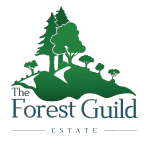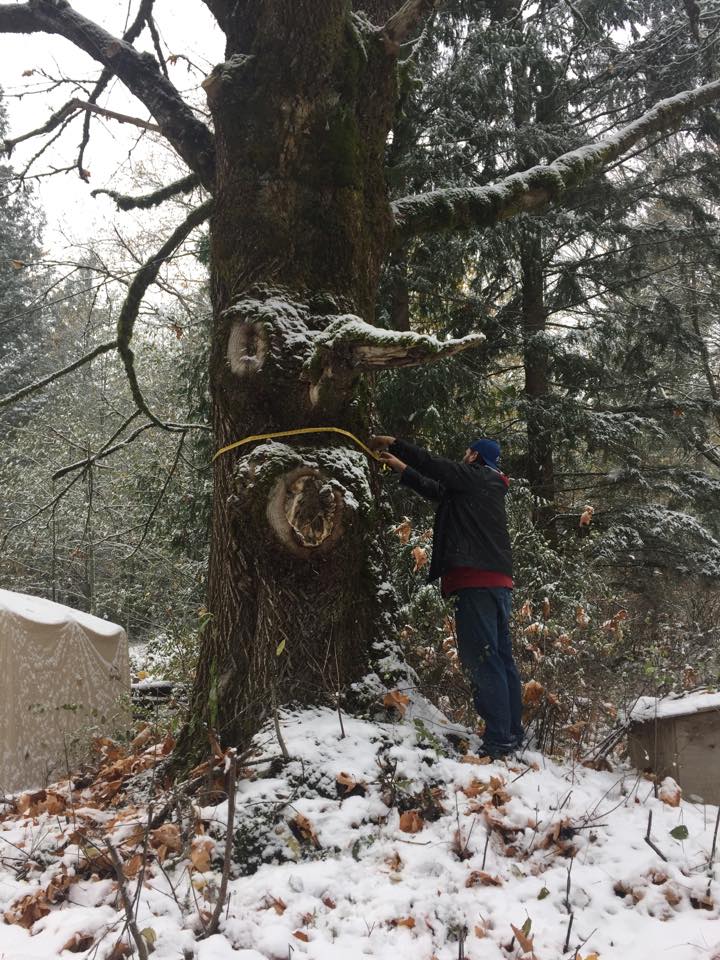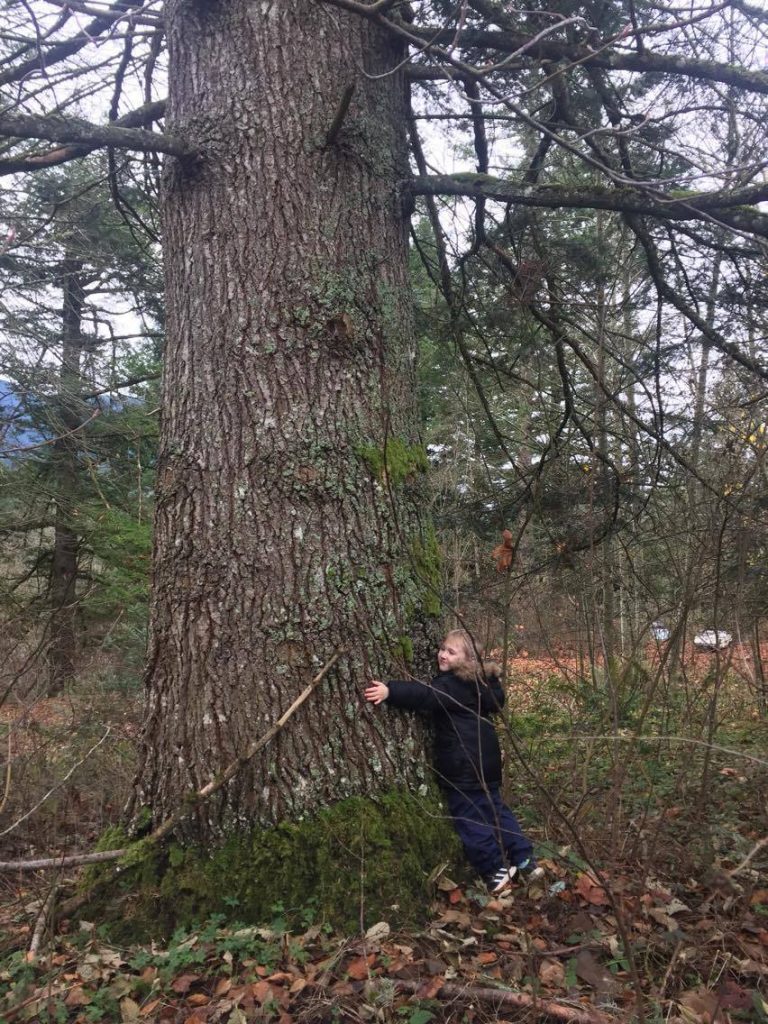
You’ve probably heard the age-old trick of counting the rings of a tree stump to determine the tree’s age. But, we love our trees and don’t want to cut them down! Luckily, Rod from Bold Point Farmstay just happened to teach me a quick and easy way to estimate the age of live trees so you don’t need to cut them down to count the rings. I am so appreciative that there are people in this world who are more than happy to help on a whim and freely educate others. It is truly a gift to receive knowledge from experienced people!
I’ll walk you through the steps we took to measure ours! The day we took the measurements, it was cold and snowy so we didn’t get to some of our biggest trees, but we did do our favourite, an unnamed big leaf maple tree who has a face, and he looks as though he could have been in the Lord of the Rings, related to Treebeard. This tree has become our unofficial mascot for the property. He should get a name soon, any suggestions? We also did a couple of Douglas Firs that line the driveway.
Here is “Treebeards cousin” He is a Big Leaf Maple ~ Acer macrophyllum

So, how do you estimate a trees age without cutting it down? It’s really easy!
First we took a measuring tape and ran it around the tree at least 4.5′ feet from the ground. Note that there are many factors that may contribute to the size of a tree other than age; i.e. the tree may have had major competition, the soil may have been extremely fertile or really crappy, all will contribute to the trees growth.

Our Big Leaf Maple is 11 foot 5 around!
Then comes the math.
Circumference= Inches around the tree
Our tree is 11 foot 5 around. So you need to calculate how many inches that is:
11 feet x 12″ (inches in a foot) =132″
132 + the extra 5 inches = 137″
So our tree is 137″ around. (Circumference)
Once you have the circumference, you need to figure out the diameter.
Diameter = Circumference divided by 3.14 (Pi)
137″ divided by Pi (3.14) = 43.63
Find the growth factor. Below is a list of growth factors for trees that are commonly found here in BC. There are many resources online if you don’t see the growth factor for your particular tree.
| Black Cottonwood | 2 |
| Black Walnut | 4.5 |
| Colorado Blue Spruce | 4.5 |
| Big Leaf Maple | 4.7 |
| Western White Pine | 5 |
| Douglas Fir | 5 |
| Norway Spruce | 5 |
| Paper Birch | 5 |
| Honeylocust | 5.9 |
| Western Flowering Dogwood (Pacific Dogwood) | 7 |
| Ironwood | 7 |
To calculate the tree’s age you have to multiply the diameter by the growth factor.
Diameter X Growth Factor = Approximate Tree Age.
Treebeard’s Big Leaf Maple growth factor is approximately 4.7 and its diameter is 43.63
43.63 diameter X 4.7 growth factor = approx 205 years old.
Wow- He is around 205 years old!
Here is a great list of trees that we have in BC that I stumbled across on the ‘net: BC Trees.
And, since math is scary for so many, I found a website that will calculate it for you! Tree Age Estimator
How old do you think this one might be? Get your kids involved even the little ones love hugging trees.

Becky is a Clinical Hypnotherapist, Registered Holistic Nutritionist, Landscape & Production Horticulturist, Arborist and budding Herbalist, who recognizes and specializes in the link between healthy soil, the gut and the brain. She also loves being the mom to her two wild and crazy kids Brooke & Connor whom keep her and her ever loving, creative husband Jay on their toes.
Becky is a Clinical Hypnotherapist, Registered Holistic Nutritionist, Landscape & Production Horticulturist, Arborist and budding Herbalist, who recognizes and specializes in the link between healthy soil, the gut and the brain. She also loves being the mom to her two wild and crazy kids Brooke & Connor whom keep her and her ever loving, creative husband Jay on their toes.
Design by NXNW.
Tamara
December 29, 2017 at 7:54 amI wish I had known about this years ago, I would have loved to have tested it with a tree in my old yard that I watched grow from a sapling to a full tree. Within ten years it shot up well over our house and had a large trunk. Sadly, the old house and that old tree are gone. ?
Becky
December 29, 2017 at 9:06 amIt is fun and it’s never too late to try!
Jessica
March 11, 2024 at 6:48 pmYour Big Maple is beautiful! Thanks for the article! You asked for a suggestion on names for Big.
M.
1. Big M.
2. Big Mac.
3. Joshua 3 Knots Pilcrow.
Pilcrow is the Paragraph symbol and because you take such good care of him, his story is not done being written. Three knots for the k ots I saw in his picture. Joshua, well because it’s such an old name.
Jessica
Becky
January 28, 2018 at 1:47 amI wonder what type of tree you had planted. I’m so sorry about the old house and the tree. It’s so hard watching places that we love get torn down and new ones being put up.
Andrea
December 30, 2017 at 1:28 amLove the photo of the tree hugging! What a sweet picture. To be honest, I only knew about counting the rings inside the tree to determine age. Great post to share with my big kids!
Becky
January 2, 2018 at 8:32 pmThanks Andrea. My little tree huggers are always hugging them. I was really excited to learn that there was another way to estimate the age without cutting the tree down as well. There is a few ways to do so, but this is the least invasive.
kristylclark@rocketmail.com
January 4, 2018 at 3:28 pmWow, this is great!!!!
Becky
January 13, 2018 at 1:29 amThank you so much Kristy. I hope you have fun trying to estimate the age of trees.
Ayana Nell
January 27, 2018 at 7:59 pmThat’s so cool! 205!! If trees could talk…am I right?! I’m glad to know there is an online calculator to help with the math…I’ll be honest, I didn’t read that bit too closely! My brain seems to avoid math at all costs…LOL.
Becky
January 27, 2018 at 10:17 pmI hear you about the math! You might want to try a little hypnotherapy to remove that old fear, it can work like a charm.
Alaina Monster
January 27, 2018 at 8:24 pmMy Kids are always asking how old a tree is on our walks. My usually responded were: baby, old, and really old. ? Now we can figure the actual estimates age out together!
Elizabeth O
January 28, 2018 at 3:45 pmThis is so interesting, I never knew you could measure the age of a tree yourself! How fun that would be on a walk with your family, to see the oldest or youngest tree you could find!
Becky
January 28, 2018 at 6:30 pmIt is a lot of fun & so easy to do!
Carol
July 30, 2018 at 10:54 pmThis is awesome! I’m so glad I found you! Thanks!
Becky
August 3, 2018 at 12:37 amThanks so much Carol!
Dhan
October 23, 2019 at 4:06 amCan anybody provide me the growth factors for (a) Teak ..Tectona grandis (b) Neem tree (Azadaricta Indica) and (c) Mango..Mangefera indica. including the references.
Becky
November 1, 2019 at 10:52 pmHey Dhan, unfortunately, those species are not native to my neck of the woods, so they aren’t in the books that I have in my collection. I hope to grow mangoes in our greenhouse! If I come across the growth factors I’ll send them to you.
x
April 22, 2021 at 4:26 pmnice
zoey
April 22, 2021 at 4:27 pmnice
Mimi Huntley
February 2, 2022 at 4:01 pmWe have a lot of live oaks here on the coast of North Carolina. We know the ages of two of our trees are 72 to 82 years old from reliable family history. If we use the trunk diameters and a growth factor of 4 recommended for live oaks, the estimated age works out to be about twice as old as we know they are. Does this mean that they have grown faster than expected? They are always in full bright sun.
Becky
April 4, 2022 at 3:18 amOh that is fabulous that you already know the ages of two of them! I wish we had a couple of oaks, they are gorgeous. We have a lot of oak furniture.
BRIAN HARRISON
May 29, 2022 at 5:51 pmIs the growth rate in inches? Would that be considered inches per year?
Paul Coulter
June 10, 2022 at 4:24 amThank you for this article. I just measure the tree in my yard, and it’s approximately 260 years old.
Becky
July 4, 2022 at 7:53 pmThat is awesome, just imagine what the tree has seen in its time!
Kristen Kunz
August 22, 2023 at 12:23 amHello Becky,
I loved your article. It is very informative and clear to follow. Those are fairly simple instructions and calculations I can do rather easily; I think the most difficult step, in some cases (at least for me, personally), would be finding the growth factor, much less identifying the type or breed of tree in the first place.
I have heard that you can get a tree core sampler which will take a sample of the rings through the center in order to determine the age a little more accurately, yet not cut the tree down, either. Would you recommend such a tool, and if so, I have been searching online for one of these tools but have not found one yet. Do you have any idea where
I could find one for sale?
~Kristen~